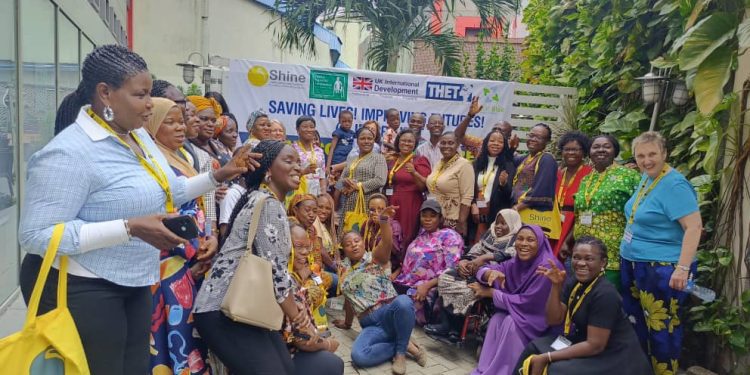
Spina bifida: Foundation trains 81 nurses, others on continence management
To enhance the quality of life for adults and children suffering from spina bifida in Nigeria, the Festus Fajemilo Foundation has trained eight community outreach workers and 81 nurses in managing bowel and bladder incontinence related to the condition.
The main issue facing people with spina bifida is both bladder and bowel incontinence.
The foundation was founded as a nonprofit organisation to offer support to individuals and families dealing with spina bifida and hydrocephalus.
In order to improve their ability to provide patients with spina bifida with high-quality care, the nurses, who were selected from eight teaching hospitals around the nation, underwent intermittent catheterisation training.
The workshop that the FFF recently held in Lagos in association with Shine Charity, a nationwide nonprofit organisation devoted to making a positive difference in the lives of people affected by spina bifida and/or hydrocephalus in the United Kingdom.
The training seeks to build and strengthen the skills, knowledge, and capacity of healthcare professionals in Nigeria to improve the life chances and futures of babies, children, and young adults with spina bifida.
The capacity-building was supported by the UK Department of Health and Social Care.
Facilitated by experts from the UK and Nigeria, the workshop looked at the different interventions available to persons with spina bifida to lead a meaningful which includes
Bowel washouts, monitoring bladder pressure, and Clean Intermittent Catheterisation are a few examples.
Afolabi Fajemilo, the co-founder and executive director, provided further context for the event by stating that they were actively collaborating with nurses in eight public teaching hospitals.
In order to serve at least 250 children in the nation who have spina bifida by 2025, he claimed they were expanding their services.
"The two-workshop on incontinence care and management for nurses from public health facilities and community outreach workers is being organised to enhance the skills, knowledge, and capacity to be able to deliver quality continence care and services across their various health facilities," he stated.
Additionally, it falls under the Savings Lives! Under the current Global Health Workforce Programme, which is aimed at three African countries—Kenya, Nigeria, and Ghana—to strengthen their health workforce and systems in the wake of COVID-19 and the brain drain, the Improving Future Project is sponsored by the United Kingdom Department of Health and Social Care.
According to Fajemilo, the FFF gives nurses in public health institutions training so they may help families whose children have spina bifida and make sure their child has a dignified life.
"The nurses are receiving our support at their places of employment. Thus, at the moment, we collaborate with eight public teaching hospitals, including Obafemi Awolowo University Teaching Hospital, University College Hospital Ibadan, and Agos University Teaching Hospital Complex; University of Benin Teaching Hospital; Rivers State University Teaching Hospital; Federal Medical Center Umuahia; Usman Dan Fodio University Teaching Hospital; Sokoto, and the University of Abuja Teaching Hospital.
“ We are supporting the hospitals to be able to have this as one of their hospital’s regular services”, he said.
According to the executive director, children with spina bifida do have additional difficulties, such as deformed legs, impaired sensation in the lower limbs, partial or complete paralysis in the lower limbs, and more serious bowel and incontinence issues.
He emphasised the need of preventive, pointing out that folic acid taken by a pregnant woman will cut the occurrence by 70%.
So, we recommend using folic acid as a preventative measure. Thus, folic acid needs to be taken by all people who are fertile.
The project's focus is on the bladder and intestinal discomfort that people experience, and there is a management procedure in place.
The outreach workers and nurses received clean intermittent catheterisation training from us. We are improving the capabilities of 81 nurses and 8 outreach nurses nationwide as part of this effort, he stated.
He claims that because of a neuropathic bladder and bowel (a bladder and bowel affected by nerve damage), people with spina bifida typically have trouble controlling their bowel and bladder motions.
"Many children with spina bifida will experience kidney problems without continence intervention; if treatment is not received, this could lead to renal failure." They'll also deal with social problems like loneliness, low self-worth, and other psychiatric concerns that could be detrimental to their mental health, he continued.
The CEO of Shine UK, Kate Steele, stated that individuals with spina bifida may suffer negative consequences from hyperactive bladder muscles that store urine at high pressures.
Unable to contain their happiness, a few attendees applauded the organisers' training, noting that it will enhance their job and the outcomes for people with spina bifida.
Our correspondent was informed by Omowumi Mary Folaranmi, an outreach worker affiliated with LUTH, that the training was enlightening and will improve their job.
Improving independent living for kids with spina bifida is one of the project's objectives. However, in certain cases, if a beneficiary has several disabilities and the parent is unable to explain or illustrate the process of clean intermittent catheterization to them”, she said.
Also speaking, an outreach worker with the University of Benin Teaching Hospital, Peace Edward, said outreach workers have a role to act as liaison officers between families of persons with spina bifida and the hospitals.
Edward expressed his gratitude to FFF for the training and the interventions thus far, noting that they had been informative, impactful, and provided a wealth of knowledge.
"We usually have periodic virtual training sessions," she stated, "so this is my first time doing face-to-face training." I now know more about continence control, though, because this has been interesting.





